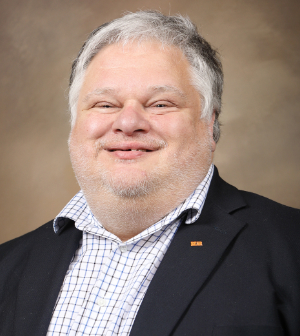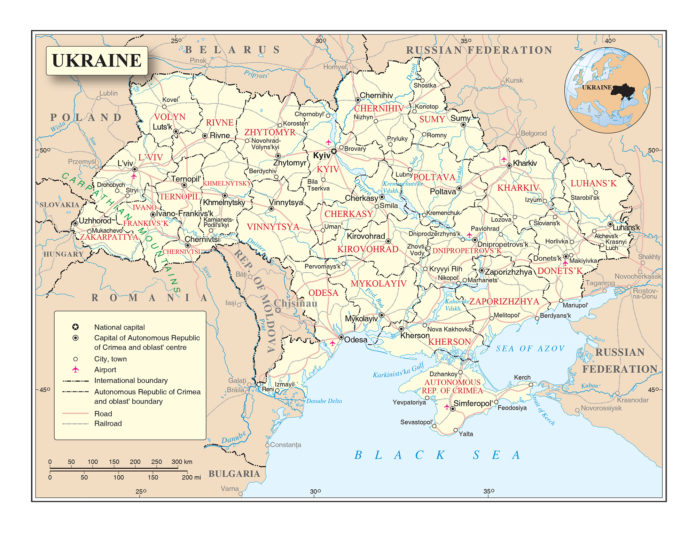Four weeks after a Mercer University professor studying in Ukraine evacuated the country at the direction of the U.S. Department of State, Russia invaded the former Soviet republic.
Russia launched its attack on Ukraine early Feb. 24, with explosions reported across the country.
Dr. Chris Grant, professor of political science in the College of Liberal Arts and Sciences, had been in the country as part of the Fulbright U.S. Scholar Program. There, he taught at Kyiv Mohyla Academy and was researching the emergence of civil society in Ukraine as a former Soviet republic.
Hours after the Russian invasion, some Mercer students had the opportunity to ask Dr. Grant, who is continuing his Fulbright research from Poland, about the developing situation in Ukraine.
Joining via Zoom, Dr. Grant took questions from students in political science lecturer Mark Dehler’s 9:30 a.m. Introduction to American Government class. Here are five of the insights he shared.

1. Russia feels threatened by Ukraine’s movement toward the West.
Last summer, Ukraine, Moldova and Georgia jointly declared their intentions to join NATO, the Western military alliance, and the European Union. This has “genuinely bothered” Russian President Vladimir Putin, Dr. Grant said.
“His understanding of the world is a very power-driven understanding of the world,” Dr. Grant said. “He grew up in a Cold War era, and he looks at the Americans as a serious rival and the Europeans as a serious rival, and he has great fears that a NATO member on his close border could provide significant hostility toward Russia.”
Putin has annexed parts of Ukraine in the past, including Crimea in 2014. This is a continuation of that Russian aggression, Dr. Grant said.
2. It’s unlikely the U.S. and other countries will give direct military support to Ukraine.
In terms of receiving direct military support from the United States and other countries, Dr. Grant said there are a few reasons why he thinks Ukraine is on its own.
For one, the world is frustrated and in disarray because of the COVID-19 pandemic, which has depressed economies and pushed people to more nationalist thinking. In addition, because Ukraine is not a NATO member, NATO countries do not have an obligation to defend Ukraine.
Finally, in terms of the U.S., Americans are very “war weary” at this point, Dr. Grant said. There is no popular sentiment to send Americans to Ukraine to fight Russia. And if the U.S. were to enter combat, Dr. Grant feared that could lead to World War III.
“The fight in Ukraine is one that the Ukrainians have to fight against the Russians,” he said. “I don’t think that anybody’s going to come to Ukraine’s aid. I think that sanctions (from other countries) are going to be what’s going to happen.”
3. Some Russian occupation of Ukraine is expected but will be difficult to maintain.
Dr. Grant expects there will be some occupation of Ukraine and a ground war. There are strong indications that Putin wants to build a territory under Russian control that would stretch across the southern part of Ukraine, so that is a possible area of occupation, Dr. Grant said.
But Ukraine is a big country geographically, and its population tops 40 million. Most of those people have no interest in being occupied by Russia, he said.
“If there’s one thing Ukrainians hate most, it’s Vladimir Putin,” he said. “They despise him, and when I was in souvenir markets a couple years ago, they sold toilet paper with Putin’s face printed on it.”
In his research, Dr. Grant found that people with Russian heritage, who may consider themselves Russians culturally or speak Russian, still see themselves as Ukrainian patriots.
“I think an ongoing occupation of Western Ukraine (would) be hard because the people are going to be very, very defiant,” he said. “Body bags coming home from Ukraine week after week after week will be devastating in Russia, and I think that will be a big problem for (Putin).”
4. Many in Ukraine did not think Russia would invade.
When the U.S. Department of State ordered Americans to leave Ukraine, many Ukrainians, and even Dr. Grant himself, did not believe the situation was that dire.
Because parts of Ukraine have had an ongoing conflict with Russia for years, many believed Russia would not invade, Dr. Grant said.
The U.S. based its actions on intelligence of a possible Russian invasion. Meanwhile, Putin was downplaying the threat, while at the same time increasing troops along the border.
“He actually added troops when he said would be withdrawing troops,” Dr. Grant said.
Concern ramped up considerably in the past four weeks, especially in the last 10 days, he said.
“I think the American strategy in the end is going to go down as a win for the Biden administration in terms of world understanding because I think they got the message of the danger, and their actions communicated the severity of what was going on, and that alerted the Ukrainian government and raised their attention.”
5. Beware of Russian propaganda on social media.
Putin is spreading propaganda on state-run television and will try to spread it throughout the rest of the world too.
Dr. Grant said Russian propaganda will focus on three topics: violence against Russian speakers, a rise of fascism in Ukraine and the militarization of Ukrainians.
He explained the truth behind the propaganda:
First, there is no evidence of violence against Russian speakers in Ukraine.
Second, the claim of a rise of fascism in Ukraine is an exaggeration of ultra-nationalist militias that exist in many places in Europe. They are small and extremist but not more of an issue in Ukraine than anywhere else.
Third, Ukrainian “militarization” is really about having an adequate defense against Russia.
“All three of these items are going to (be) the propaganda that will be used to try to convince the world that Russia is under threat by Ukraine,” Dr. Grant said.
Propaganda “will come through a number of sources, and we already know the Russians are quite adept at using our social media to feed us information,” he warned. “So, watch for it because it’s coming.”









